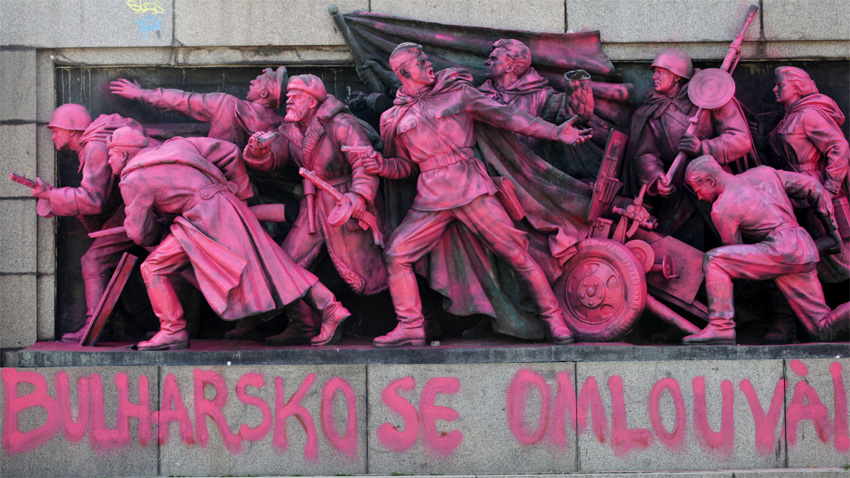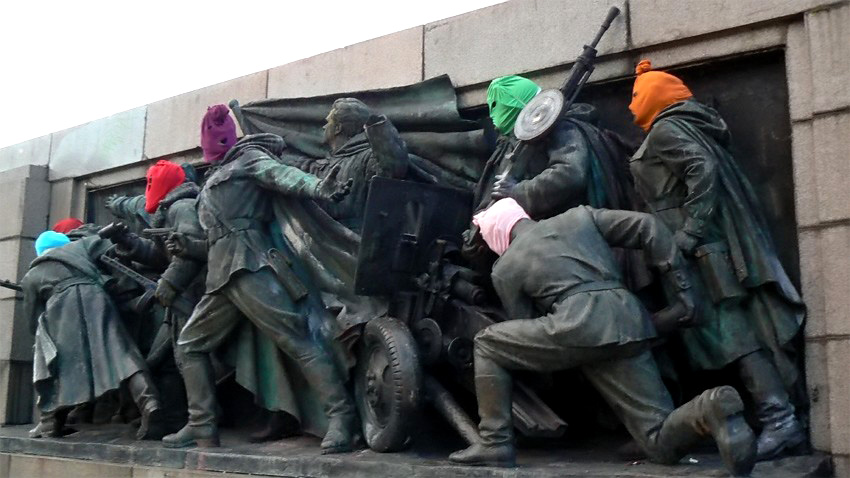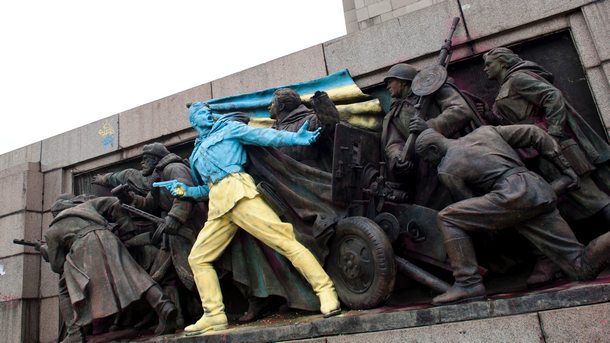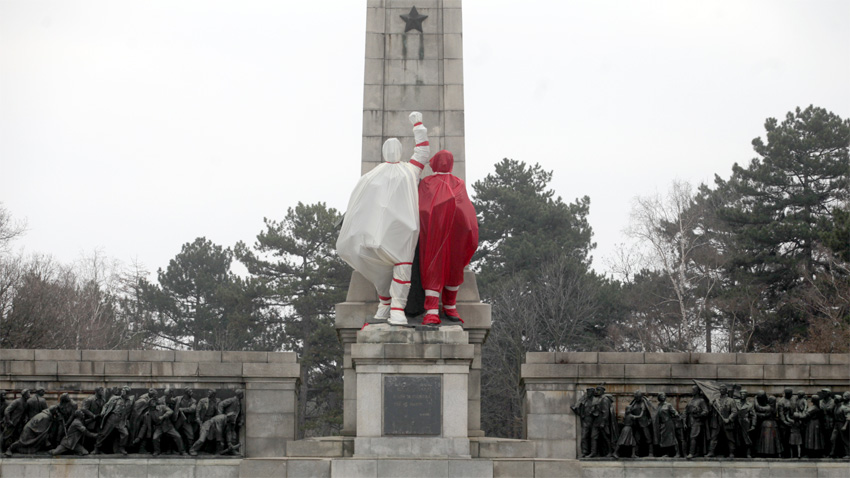Monuments of Soviet soldiers, Bulgarian guerrillas and socialist heroes in the Bulgarian capital city of Sofia are more and more often seen transformed. The designers of the new clothes for the old communist monuments are young people engaged in street and conceptual art. Their massages vary from purely aesthetic to ideological. Every case causes a wave of reactions, too.
The Monument of the Soviet Army downtown Sofia often becomes the target of art attacks. Discussions about its place emerged in the early years after the fall of totalitarianism. Some people see the monument as important in preserving historical memory, while for others it is a grim reminder of a totalitarian past imposed on Bulgaria by the Soviet Union.

During the past year, the Soviet Army Monument was once painted in pink. “Bulgaria appologizes” was written in Czech, too. The reason was the 45th anniversary since the invasion of Warsaw Pact troops in Czechoslovakia, which marked the end of political liberalization in the country called “The Prague Spring.” Bulgaria was the first country calling for military intervention in Czechoslovakia and the last to apologize for taking part in the suppression of the Prague Spring. This happened with a decision of parliament in 1990. Last year the monument also served to show support for the performers from Russian punk band Pussy Riot, protesting against the rule of President Putin.

In June 2011, the figures of Soviet soldiers in Sofia were transformed into famous American comic book heroes. People could see Superman with a gun, the Joker, Batman 's assistant - Robin, Santa Claus with military binoculars and even Ronald MacDonanld fighting under the U.S. flag. “In pace with time” was written under the soldiers.
 While authorities in the capital city continue arguing if the monument of the Soviet army should remain in the center of Sofia, street artists continue with their activities. Because of the Russian intervention in the autonomous region of the Crimea, the monument was recently decorated with a red inscription reading "Hands off Ukraine."
While authorities in the capital city continue arguing if the monument of the Soviet army should remain in the center of Sofia, street artists continue with their activities. Because of the Russian intervention in the autonomous region of the Crimea, the monument was recently decorated with a red inscription reading "Hands off Ukraine."
“A Soviet monument in Sofia, Bulgaria has been painted in the colours of the Ukrainian flag, sparking protest from Russia,” the BBC informed. The Russian embassy in Bulgaria sent a protest note to the Bulgarian Foreign Ministry, insisting on investigation of what they called a "vandal incident."
On the occasion of March 1, another socialist monument in the Borissova Gradina park in Sofia was transformed. The monuments of communist guerillas was covered with white and red, thus becoming a giant “martenitza,” a Bulgarian symbol of the coming spring. The Destructive Creation group, who stand behind the realization of the idea, chose this monument to remind us that we should not worship foreign heroes and should pay more attention to traditional Bulgarian symbols.

On March 5, the guerrilla monument was painted in the colors of the Polish and Ukrainian flags because of the anniversary of the Katyn massacre. On this day in 1940, 22,000 captured Polish soldiers, officers and intellectuals were executed by the Soviet secret police. In 1943 when Nazi Germany announced the discovery of the mass graves, the Soviet Union denied allegations and accused the Wehrmacht of the massacre. In 1990, Gorbachov officially acknowledged and condemned the perpetration of the killings by the NKVD.
What are the monuments of Soviet soldiers symbols of? This question continues to divide Bulgarian society that used to be nurtured for decades with the cliché of the "Russian brothers liberators" but has already realized that history can be read from another perspective.
English version: Alexander Markov
21 February is International Mother Language Day, first proclaimed as such by UNESCO and later adopted by the UN General Assembly. The right to study and to speak one’s mother tongue, or native language, is a basic human right and a civil right..
152 years after the death of the Apostle of Freedom, the personality of Vasil Levski continues to excite Bulgarians, regardless of whether they are in the country or abroad. The Embassy of Bulgaria in Athens, Greece , has extended an invitation to the..
Easter 2020 went down in history with two things. The first was the state of emergency, introduced due to the Covid-19 pandemic that imposed a number of restrictions on us, the consequences of which we are still recovering from. The..
21 February is International Mother Language Day, first proclaimed as such by UNESCO and later adopted by the UN General Assembly. The right to..

+359 2 9336 661
